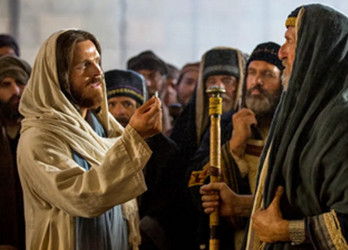Religious leaders do not come off too well in today's first and Gospel readings. The reading from Malachi is an indictment against religious leaders who have been guilty of violating their responsibility as teachers. They have not observed God's ways and have taught falsely. They failed in their roles as leaders and teachers. Over the last few weeks in the Gospels we have seen Jesus as He parries with the chief priests and elders of the people. Now he takes on the Pharisees, Sadducees and scribes.
 But the scriptures speak not only to certain religious leaders, but to all believers. As such, these readings hit very close to home. We all must search our consciences not because we have committed similar crimes, but because we all fall short of the ideals we profess and teach. We certainly are aware of our responsibilities to teach by word and example. Yet as we reflect at the end of a day on how well we lived up to what we profess and teach, we know we fall short.
But the scriptures speak not only to certain religious leaders, but to all believers. As such, these readings hit very close to home. We all must search our consciences not because we have committed similar crimes, but because we all fall short of the ideals we profess and teach. We certainly are aware of our responsibilities to teach by word and example. Yet as we reflect at the end of a day on how well we lived up to what we profess and teach, we know we fall short.
Jesus is not accusing the scribes and Pharisees of not knowing their religion. They knew it very well. They were even good at teaching it to others. It is just that they didn’t practice what they taught and preached. These strict teachers made religious observance very difficult for the ordinary person, and Jesus accuses them of taking a position they themselves do not follow. Nor do they do anything to relieve the heavy burdens they have imposed on others.
But there is more to today's Gospel than simply listening to Jesus scold the Pharisees and scribes. Beneath His words Jesus is addressing the concept of religious power and what can happen when that power is misused. In the eyes of most of his contemporaries, Jesus was a minor celebrity, a passing fad, a faint blip on the screen. They saw him as uninteresting and unimportant. Jesus was an ordinary Jewish layman who abandoned his livelihood and hometown. He voluntarily lived on the margin of society and religion. He became the uninivited houseguest who always relied on the kindness of strangers and who undertook a prophetic ministry within a world where a privileged aristocracy contolled the Temple, its liturgy, its priesthood, its jobs, its markets, its income and its idealogies.
The problem with an elite system of power - the problem with being in charge - is that one can get very used to it. Before long, one can actually start to believe, with all one's heart, that he/she is in charge of everything, of everyone. And that is a dangerous place for a person to be. Being a layperson was Jesus' ticket to certain failure in a world where those who "have" get more, and those who "have not" get had. What is even more unbelievable is that Jesus willingly embraced this state of being - all the way to the cross. He became what he healed and He became the death that He died. And in that, He became the triumph of Easter and the power of the Empty Tomb.
This is the "power" that Jesus meant all of us to share. It is the power to join together, to claim our beliefs as our own - not borrowed from or brokered by the powerful. It is the power to act on our beliefs. It is the power that enables us to meet Risen Jesus by seeking Him in the presence of the poor, in the thick of life, in the least and the littlest, in a community gathered together around a table, in bread and in wine.
Pope Saint John XXIII once described the church as a "community of peace, willing to walk along the road with anyone as far as possible." Jesus shows us that the goal of being a disciple is not canonization, but compassion. It is the capacity to live fiercely, to love radically, and to walk humbly with the God whose gift of self arrives always and only in the company of strangers. We must dare to become that kind of community -





